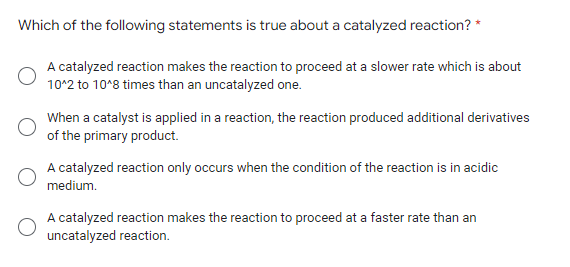Which of the following statements is true about a catalyzed reaction? * A catalyzed reaction makes the reaction to proceed at a slower rate which is about 10^2 to 10^8 times than an uncatalyzed one. When a catalyst is applied in a reaction, the reaction produced additional derivatives of the primary product. A catalyzed reaction only occurs when the condition of the reaction is in acidic medium. A catalyzed reaction makes the reaction to proceed at a faster rate than an uncatalyzed reaction.
Which of the following statements is true about a catalyzed reaction? * A catalyzed reaction makes the reaction to proceed at a slower rate which is about 10^2 to 10^8 times than an uncatalyzed one. When a catalyst is applied in a reaction, the reaction produced additional derivatives of the primary product. A catalyzed reaction only occurs when the condition of the reaction is in acidic medium. A catalyzed reaction makes the reaction to proceed at a faster rate than an uncatalyzed reaction.
Chemistry for Today: General, Organic, and Biochemistry
9th Edition
ISBN:9781305960060
Author:Spencer L. Seager, Michael R. Slabaugh, Maren S. Hansen
Publisher:Spencer L. Seager, Michael R. Slabaugh, Maren S. Hansen
Chapter8: Reaction Rates And Equilibrium
Section: Chapter Questions
Problem 8.20E: In each of the following, which reaction mechanism assumption is apparently being violated? Explain...
Related questions
Question

Transcribed Image Text:Which of the following statements is true about a catalyzed reaction? *
A catalyzed reaction makes the reaction to proceed at a slower rate which is about
10^2 to 10^8 times than an uncatalyzed one.
When a catalyst is applied in a reaction, the reaction produced additional derivatives
of the primary product.
A catalyzed reaction only occurs when the condition of the reaction is in acidic
medium.
A catalyzed reaction makes the reaction to proceed at a faster rate than an
uncatalyzed reaction.
Expert Solution
This question has been solved!
Explore an expertly crafted, step-by-step solution for a thorough understanding of key concepts.
Step by step
Solved in 2 steps with 2 images

Knowledge Booster
Learn more about
Need a deep-dive on the concept behind this application? Look no further. Learn more about this topic, chemistry and related others by exploring similar questions and additional content below.Recommended textbooks for you

Chemistry for Today: General, Organic, and Bioche…
Chemistry
ISBN:
9781305960060
Author:
Spencer L. Seager, Michael R. Slabaugh, Maren S. Hansen
Publisher:
Cengage Learning


Chemistry: The Molecular Science
Chemistry
ISBN:
9781285199047
Author:
John W. Moore, Conrad L. Stanitski
Publisher:
Cengage Learning

Chemistry for Today: General, Organic, and Bioche…
Chemistry
ISBN:
9781305960060
Author:
Spencer L. Seager, Michael R. Slabaugh, Maren S. Hansen
Publisher:
Cengage Learning


Chemistry: The Molecular Science
Chemistry
ISBN:
9781285199047
Author:
John W. Moore, Conrad L. Stanitski
Publisher:
Cengage Learning

Chemistry for Engineering Students
Chemistry
ISBN:
9781337398909
Author:
Lawrence S. Brown, Tom Holme
Publisher:
Cengage Learning

Chemistry: Principles and Reactions
Chemistry
ISBN:
9781305079373
Author:
William L. Masterton, Cecile N. Hurley
Publisher:
Cengage Learning

Introductory Chemistry: An Active Learning Approa…
Chemistry
ISBN:
9781305079250
Author:
Mark S. Cracolice, Ed Peters
Publisher:
Cengage Learning